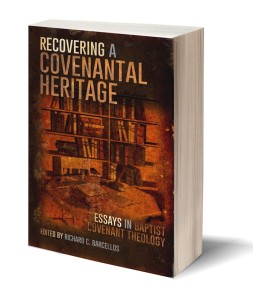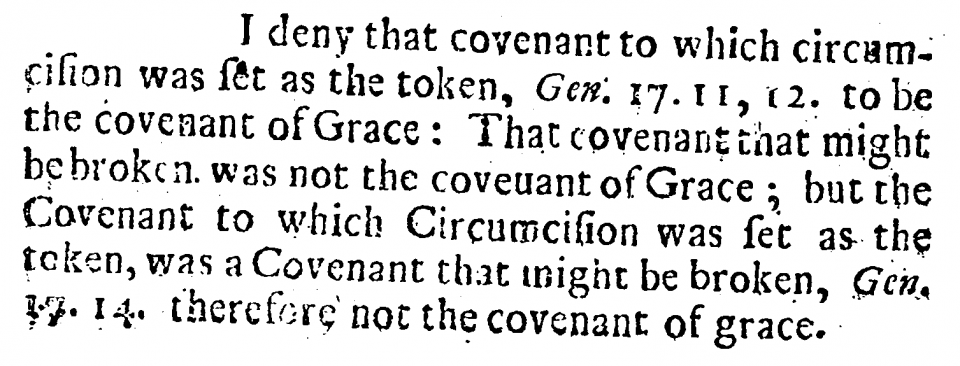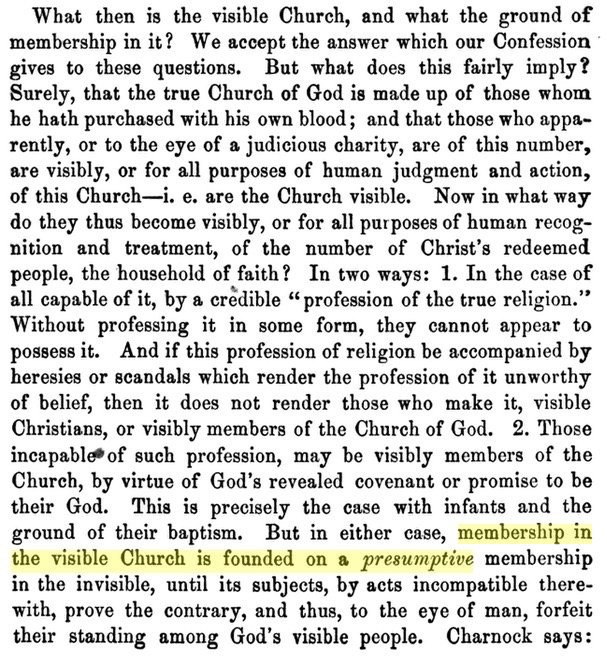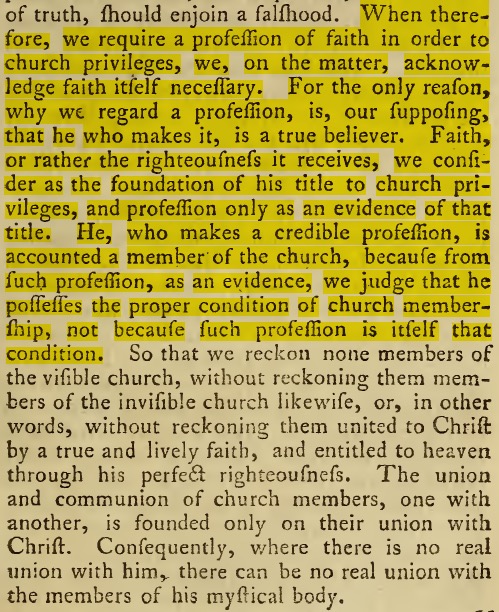Additional Resources
Chapter 1 of Recovering a Covenantal Heritage
On 02, Dec 2014 | In Richard Barcellos | By Brandon Adams
[PDF with full footnotes available HERE]
See here for information on purchasing Recovering a Covenantal Heritage
CHAPTER 1
A Brief Overview of Seventeenth-Century
Reformed Orthodox Federalism
Richard C. Barcellos, Ph.D.1
It is no secret that various seventeenth-century Reformed orthodox theologians articulated theology utilizing a federal or covenantal model. There are many sources (primary and secondary) available for the contemporary reader which amply display and discuss this model.2 We will examine briefly a few of the more important federal theologians of the seventeenth century to introduce readers to the world of seventeenth-century federal or covenant theology. This brief survey understands federal theology as a method and not as a distinct school.3
Federal or covenant theology did not begin in the seventeenth century. The seventeenth-century Reformed orthodox built upon the labors of their Reformed predecessors, who built upon the labors of others before them. Such theologians as Zwingli, Bullinger, Calvin, Ursinus, Olevianus, Rollock, Perkins, Ames, and Ball all played key roles in the early development of federal theology.4 We will look briefly at some of the key contributors to the development of federalism in the early and late seventeenth century, and even into the eighteenth century, to provide a wider context to introduce the reader to the thought-world of post-Reformation federalism. This should assist the reader as he continues through this volume. Knowing the historical-theological issues of the most productive era of the formulation of federal or covenant theology (among paedobaptists and Particular Baptists) will introduce readers to the ways and means utilized in such formulations and help understand some of the post-Reformation confessional statements and the biblical and theological issues at stake. Read more…
Richard C. Barcellos, Ph.D., is pastor of Grace Reformed Baptist Church, Palmdale, CA (www.grbcav.org), and author of The Family Tree of Reformed Biblical Theology: Geerhardus Vos and John Owen – Their Methods of and Contributions to the Articulation of Redemptive History, Better than the Beginning: Creation in Biblical Perspective, and The Lord’s Supper as a Means of Grace: More than a Memory. This chapter is a slightly revised section from the author’s The Family Tree of Reformed Biblical Theology and is used with permission. ↩
For instance, for primary sources see Herman Witsius, The Economy of the Covenants Between God and Man: Comprehending A Complete Body of Divinity, Two Volumes (Escondido, CA: The den Dulk Christian Foundation, Reprinted 1990); Nehemiah Coxe and John Owen, Covenant Theology From Adam to Christ (Owensboro, KY: RBAP, 2005); Samuel Bolton, The True Bounds of Christian Freedom (Edinburgh: The Banner of Truth Trust, Reprint edition of 1978); Edward Fisher, The Marrow of Modern Divinity: In Two Parts – Part I. the Covenant of Works and the Covenant of Grace; Part II. An Exposition of the Ten Commandments (Edmonton, AB, Canada: Still Water Revival Books, Reprint edition of 1991); Francis Turretin, Institutes of Elenctic Theology, Volume Two (Phillipsburg, NJ: P&R Publishing, 1994); and for secondary works see A. T. B. McGowan, The Federal Theology of Thomas Boston (Edinburgh: Rutherford House, 1997); John Von Rohr, The Covenant of Grace in Puritan Thought (Atlanta: Scholars Press, 1986); John L. Girardeau, The Federal Theology: Its Import and Its Regulative Influence (Greenville, SC: Reformed Academic Press, 1994); Charles S. McCoy and J. Wayne Baker, Fountainhead of Federalism: Heinrich Bullinger and the Covenantal Tradition (Louisville: Westminster/John Know Press, 1991); Mark W. Karlberg, Covenant Theology in Reformed Perspective: Collected Essays and Book Reviews in Historical, Biblical, and Systematic Theology (Eugene, OR: Wipf and Stock Publishers, 2000); Lyle D. Bierma, German Calvinism in the Confessional Age: The Covenant Theology of Caspar Olevianus (Grand Rapids: Baker Book House, 1996); Rowland S. Ward, God & Adam: Reformed Theology and The Creation Covenant – An Introduction to the Biblical Covenants – A Close Examination of the Covenant of Works (Wantirna, Australia: New Melbourne Press, 2003); Peter Golding, Covenant Theology: The Key of Theology in Reformed Thought and Tradition (Ross-shire, Scotland: Christian Focus Publications, 2004); Peter Lillback, The Binding of God: Calvin’s Role in the Development of Covenant Theology (Grand Rapids: Baker Academic, 2001); Willem J. van Asselt, The Federal Theology of Johannes Cocceius (1603-1669) (Leiden, Boston, Koln: Brill, 2001); John Murray, “Covenant Theology” in Collected Writings, Volume Four (Edinburgh: The Banner of Truth Trust, 1982), 216-40; Geerhardus Vos, “The Doctrine of the Covenant in Reformed Theology” in Richard B. Gaffin, Jr., editor, Redemptive History and Biblical Interpretation (Phillipsburg, NJ: P&R Publishing, 1980), 234-67. ↩
Cf. Willem J. van Asselt, “The Fundamental Meaning of Theology: Archetypal and Ectypal Theology in Seventeenth-Century Reformed Thought,” Westminster Theological Journal (WTJ) 64 (2002): 323, where he notes, “This should warn us against any facile juxtaposition of federal-biblical theology with scholastic-dogmatic theology…” ‘This’ in context refers to the fact that many late sixteenth- and seventeenth-century Reformed theologians utilized Junius’ classification of archetypal and ectypal knowledge. Van Asselt claims that this is true of continental Reformed theologians as well as some English Puritans. John Owen makes such distinctions in his Biblical Theology (Pittsburgh: Soli Deo Gloria, 1994). (Cf. Chapter 8 of my The Family Tree of Reformed Biblical Theology, Owen, Biblical Theology, Chapter 3 Book I, and Sebastian Rehnman, Divine Discourse: The Theological Methodology of John Owen (Grand Rapids: Baker Academic, 2002), 57-71 for an extended discussion as it relates to Owen.). Once again, this is further evidence that Reformed scholasticism was a complex method and not a static system of theology. Reformed orthodox theologians could be and were often both scholastic and federal. ↩
For a well-referenced treatment of the history of federal theology in the post-Reformation era see Ward, God & Adam. Cf. also Golding, Covenant Theology, 13-66. ↩
Kingdom Through Covenant (Review)
On 01, Dec 2014 | In Resources, Samuel Renihan | By Brandon Adams
Kingdom through Covenant: A Biblical-Theological Understanding of the Covenants
A Review Article
Samuel Renihan1
Just as the Israelites feared to enter Canaan because there were giants in the land, so also the one who approaches Kingdom through Covenant2 must consider the viability of digesting and interacting with a work of such magnitude. That being said, Gentry and Wellum have produced a book worthy both of digestion and interaction. Read more…
Samuel Renihan, M.Div., is a pastor at Trinity Reformed Baptist Church, La Mirada, CA. This review article was published in the Journal of the Institute of Reformed Baptist Studies (2014): 153-76, and is used with permission from RBAP. ↩
Peter J. Gentry and Stephen J. Wellum, Kingdom through Covenant: A Biblical-Theological Understanding of the Covenants (Wheaton, IL: Crossway, 2012, 848pp.). ↩
Pascal Denault Covenant Theology (1689 Conference)
On 28, Nov 2014 | In Audio, Pascal Denault, Resources | By Brandon Adams
Pascal Denault recently taught on the covenant theology of the 1689 London Baptist Confession at the first annual 1689 Conference.
Here is the MP3
Here are other formats.
Here are the rest of the sessions from the conference.
The Oneness of the Church (Owen)
On 24, Nov 2014 | In Resources | By Brandon Adams
Below is an essay from John Owen found in his introduction to his commentary on the book of Hebrews. I’m posting it here for simple reference as I cannot find it anywhere else online as a single, separate article. The text is copied from http://www.godrules.net/library/owen/131-295owen_q3.htm
This essay has very important implications for how to properly interpret the olive tree of Romans 11.
Note that Owen argues against the idea that the nation of Israel was the church. Instead, he argues that the church in the Old Testament was the elect remnant within the nation of Israel. He says there were two offspring of Abraham: physical and spiritual. And there were two types of promises made to Abraham to correspond to these offspring: physical/temporal and spiritual/eternal. And these two types of promises were both covenantal promises. They were both parts of the Abrahamic Covenant. Thus the Abrahamic Covenant is both carnal and spiritual. It existed in a mixed state until the coming of Christ, but it has now been separated. Owen’s essay on the Oneness of the Church should be read in light of the following comment he makes later in his commentary:
When we speak of the “new covenant,” we do not intend the covenant of grace absolutely, as though it were not before in existence and effect, before the introduction of that which is promised here. For it was always the same, substantially, from the beginning. It passed through the whole dispensation of times before the law, and under the law, of the same nature and effectiveness, unalterable, “everlasting, ordered in all things, and sure.” All who contend about these things, the Socinians only excepted, grant that the covenant of grace, considered absolutely, — that is, the promise of grace in and by Jesus Christ, —was the only way and means of salvation to the church, from the first entrance of sin.
But for two reasons, it is not expressly called a covenant, without respect to any other things, nor was it called a covenant under the old testament. When God renewed the promise of it to Abraham, he is said to make a covenant with him; and he did so, but this covenant with Abraham was with respect to other things, especially the proceeding of the promised Seed from his loins. But absolutely, under the old testament, the covenant of grace consisted only in a promise; and as such only is proposed in the Scripture,
EXERCITATION 6.
ONENESS OF THE CHURCH.
1. Oneness of the church — Mistake of the Jews about the nature of the promises.
2. Promise of the Messiah the foundation of the church; but as including the covenant.
3. The church confined unto the person and posterity of Abraham — His call and separation for a double end.
4. Who properly the seed of Abraham.
5. Mistake of the Jews about the covenant.
6. Abraham the father of the faithful and heir of the world, on what account.
7. The church still the same.
Covenant of Circumcision is Not the Covenant of Grace
On 22, Nov 2014 | In Resources | By Brandon Adams
-Anonymous Particular Baptist
Biblical-Theological Exposition and Hermeneutics
On 19, Nov 2014 | In Resources, Richard Barcellos | By Brandon Adams
by Richard Barcellos [PDF available here]
The Bible is a big book. It contains 66 books written by many different human authors over a wide range of time and in diverse geographic, cultural, political, and religious circumstances. There are two main sections to our English Bibles – the Old and the New Testament. There are several different genres of literature in the Bible – e.g., narrative/history, law, poetry, prophecy, gospels (i.e., theological biographies), epistles, and apocalyptic. These factors make interpreting the Bible a difficult task at times. Those who do not view the Bible as the inspired, infallible, and inerrant written Word of God often use these factors to pit one section of Scripture against others. They do not see it as containing a system of doctrine. System, in their thinking, is impossible due to the various human authors and other factors mentioned above. Denying divine inspiration, there is no reason to expect a cohesive story-line and doctrinal continuity.
Those of us who view the Bible as the written Word of God, however, are committed to allow it to speak authoritatively on anything and everything it comments upon. And one the things the Bible comments upon is itself. In other words, texts often pick up on previous texts and further explain their meaning. This happens with words, phrases, verses, passages, persons, events, institutions, places, and concepts. When this occurs, it is the divine use or interpretation of a previous divine revelation. In other words, the Bible sometimes interprets the Bible for us and when it does, the way subsequent revelation interprets and applies antecedent revelation gives us (at least in part) the divinely intended meaning of the antecedent text. This is not to say that the interpreter of a text cannot find out its meaning unless the Bible interprets it for us, but it is to say that when the Bible interprets itself, the interpretation is infallible and reflective of the divine intention for and use of that text. Because the Bible is divinely inspired, a whole- Bible hermeneutic is crucial in understanding both the parts and the whole of Scripture. Read more…
Barcellos’ Short Writings on Covenant Theology
On 19, Nov 2014 | In Resources, Richard Barcellos | By Brandon Adams
Below are several short writings from Richard Barcellos related to covenant theology. You can also download them here combined in one PDF.
- How Old is Covenant Theology?
- A Typical Objection to the Covenant of Works: Stated, Answered, Concluded
- Was Adam placed in a covenantal relationship with God?
Barcellos’ Short Writings on the Law
On 19, Nov 2014 | In Resources, Richard Barcellos | By Brandon Adams
Below are links to various short writings from Richard Barcellos related to the law. They are also available combined as one PDF.
- Definition of Key Terms and Phrases
- Some thoughts on the three-fold division of the law
- Some thoughts on Moral Law, Positive Law, the Ten Commandments, the New Covenant, and the Ground of our Justification
- Typical Objections to the Ten Commandments and Christians
- The Second London Baptist Confession of 1689 on the Decalogue
- On the use of the word “law” (nomos) with and without the Greek article
Redeemer Radio: The Law of God
Richard Barcellos was interviewed on Redeemer Radio on Chapter 19 of the London Baptist Confession of Faith.
The Decalogue in the Thought of Key Reformed Theologians with Special Reference to John Owen
On 17, Nov 2014 | In Resources, Richard Barcellos | By Brandon Adams
The following is Appendix Two in Richard Barcellos’ The Family Tree of Reformed Biblical Theology. Here is a PDF version.
Introduction
In this Appendix, we will explore the thought of John Owen, as well as several other Reformed theologians from the 16th-18th centuries, on the functions of the Decalogue. We will note the various nuances of terminology and theological formulation among Reformed theologians of the past. But we will also see basic methodological and theological continuity from John Calvin to Thomas Boston. This, once again, displays Owen’s continuity with the Reformed tradition and the continuity among the Reformed orthodox on this subject. As will be seen, the Reformed orthodox approached this subject utilizing a redemptive-historical hermeneutic, something we noted in Chapter Six.
Our focus will be upon John Owen. He is not always easy to understand and has been misused on the issue of the functions of the Decalogue. We will seek to allow him to speak for himself, offer some observations, and compare Owen’s statements with those of others before and after him. This will display, among other things, the fact that Owen fits within the broader theological tradition of Reformed thought on the functions of the Decalogue in redemptive history. Read more…






